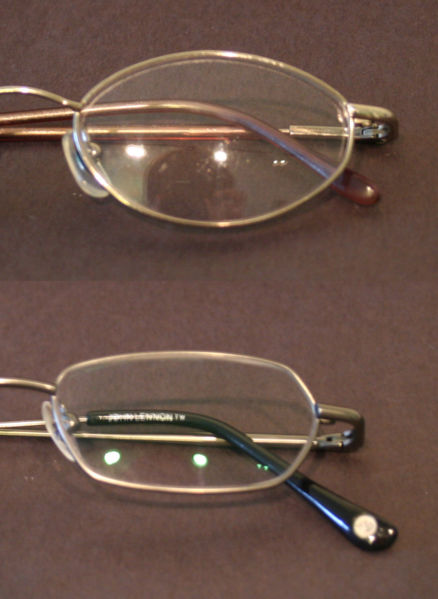石鑫华视觉
增透膜(英语:Anti-reflective coating,AR)是一种表面光学镀层,它通过减少光的反射而增加透过率。在复杂的光学系统中,它可以通过减少系统中的散射光来提高对比度,例如望远镜,这对天文学十分重要。其他方面,增透膜能减少暗处双筒望远镜的闪光。
很多涂层都包括折射率不同的透明的薄膜结构thin film structures with alternating layers of contrasting. 薄膜的厚度决定了其作用的反射光波长。当光线在增透膜上产生二次反射时,会和原反射光发生干涉,从而减弱反射光。而根据能量守恒,光的能量不变。因此当反射光减少时,透射光便增多。这就是增透膜的原理。一般,选择增透膜时需确定波长,如红外线,可见光以及紫外线。

没有镀膜的眼镜镜片(上方)比镀上增透模的眼镜镜片反射更多光波。特别注意到镀膜的眼镜镜片的反射带有些许颜色。
涂层材料
氟化钙 氟化镁 氧化钛 硫化铅 硒化铅
乙烯基倍半硅氧烷杂化膜 金刚石薄膜
技术
真空镀膜 化学气相沉积 溶胶—凝胶法
(视力)校正镜片
Opticians dispense "anti-reflection lenses" because the decreased reflection makes them look better, and they produce less glare, which is particularly noticeable when driving at night or working in front of a computer monitor. The decreased glare means that wearers often find their eyes are less tired, particularly at the end of the day. Allowing more light to pass through the lens also increases contrast and therefore increases visual acuity.
Antireflective ophthalmic lenses should not be confused with polarized lenses, which decrease (by absorption) the visible glare of sun reflected off of surfaces such as sand, water, and roads. The term "antireflective" relates to the reflection from the surface of the lens itself, not the origin of the light that reaches the lens.
Many anti-reflection lenses include an additional coating that repels water and grease, making them easier to keep clean. Anti-reflection coatings are particularly suited to high-index lenses, as these reflect more light without the coating than a lower-index lens (a consequence of the Fresnel equations). It is also generally easier and cheaper to coat high index glasses.
光刻
在微电子技术的光刻工艺中, 增透膜可以减少光斑的畸变。不同的增透膜适用不同的 光致抗蚀剂, 另外,也可以减少驻波,薄膜干涉以及镜面反射.
工业镜头
现在使用的工业镜头,无论是定焦镜头、变焦镜头、CCTV镜头、远心镜头,基本上都使用了增透膜。有单层的,也有多层镀膜的。因此现在的工业镜头,其透光性能通常都非常好。
折射率匹配
单层膜
多层膜
吸收
蛾眼